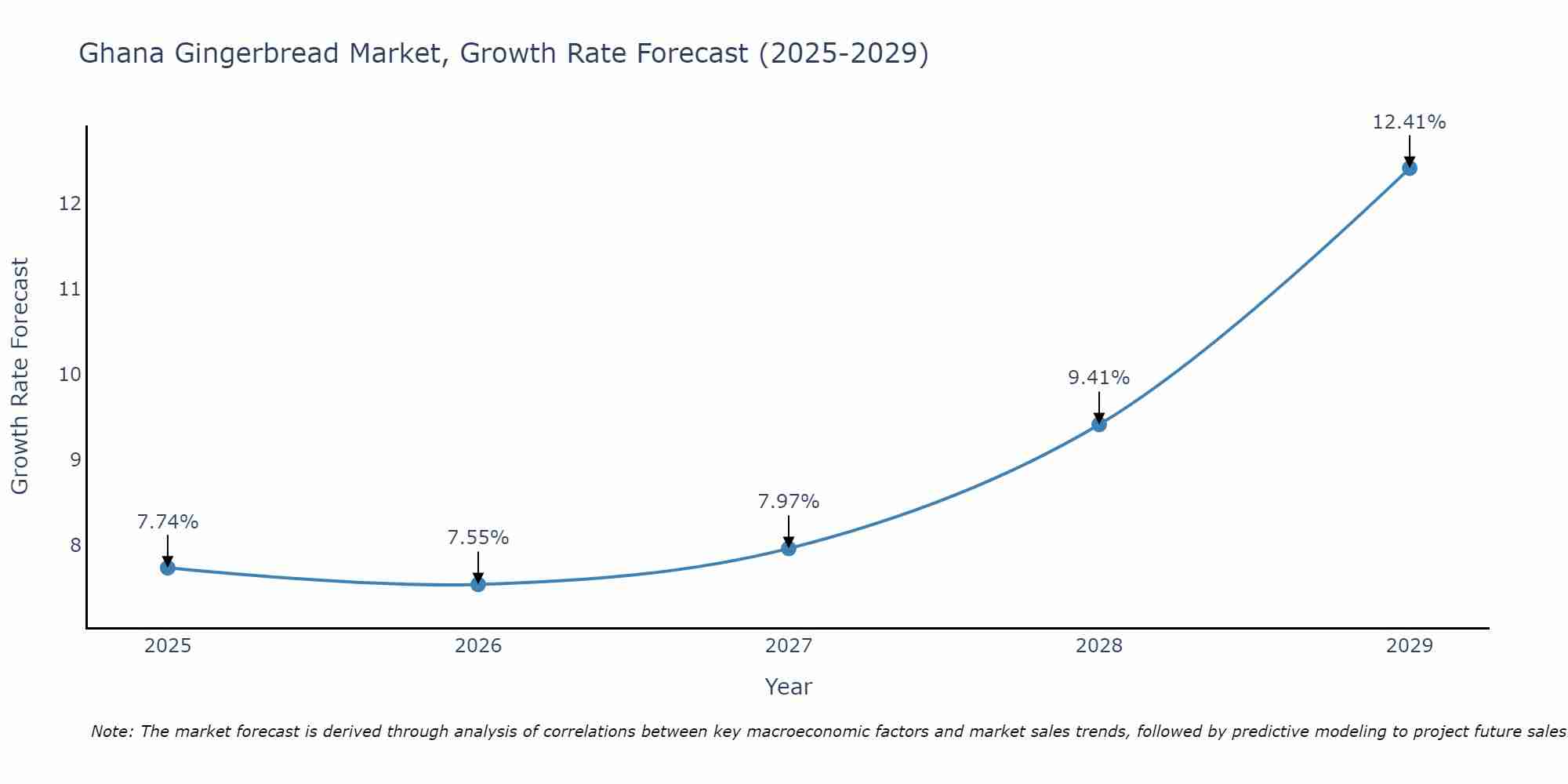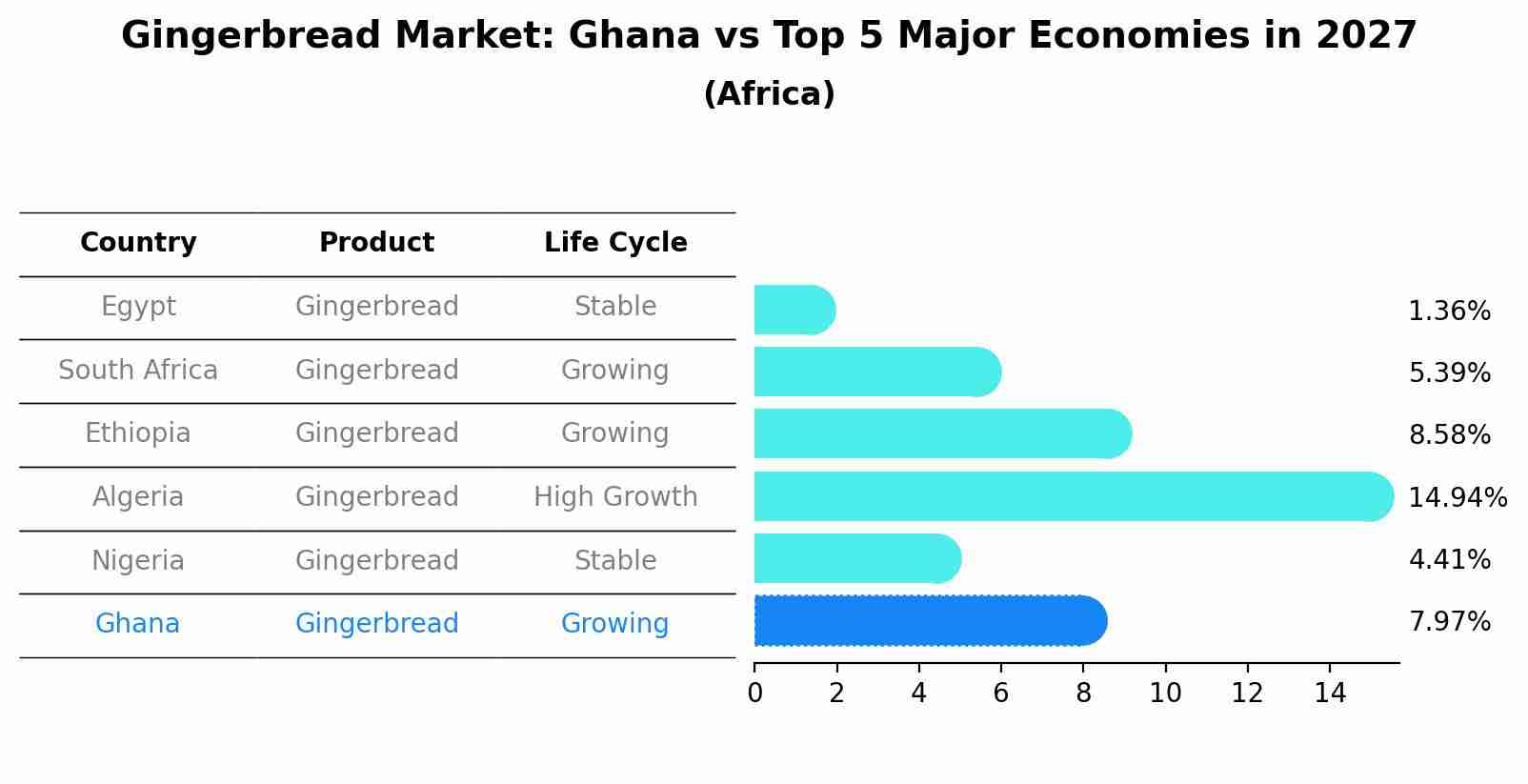Ghana Gingerbread Market (2025-2031) Outlook | Growth, Industry, Share, Trends, Analysis, Value, Forecast, Size, Companies & Revenue
| Product Code: ETC410872 | Publication Date: Oct 2022 | Updated Date: Jul 2025 | Product Type: Market Research Report | |
| Publisher: 6Wresearch | Author: Shubham Deep | No. of Pages: 75 | No. of Figures: 35 | No. of Tables: 20 |
Ghana Gingerbread Market Size Growth Rate
The Ghana Gingerbread Market is projected to witness mixed growth rate patterns during 2025 to 2029. The growth rate starts at 7.74% in 2025 and reaches 12.41% by 2029.

Gingerbread Market: Ghana vs Top 5 Major Economies in 2027 (Africa)
By 2027, the Gingerbread market in Ghana is anticipated to reach a growth rate of 7.97%, as part of an increasingly competitive Africa region, where Egypt remains at the forefront, supported by South Africa, Ethiopia, Algeria and Nigeria, driving innovations and market adoption across sectors.

Ghana Gingerbread Market Synopsis
The Ghana gingerbread market is experiencing steady growth due to increasing consumer interest in traditional and natural ingredients. Gingerbread products, such as cookies, cakes, and pastries, are gaining popularity among Ghanaians as well as expatriates living in the country. The market is characterized by a variety of offerings, including both homemade and commercially produced gingerbread products. Local bakeries and confectionery companies are capitalizing on this trend by introducing innovative flavors and packaging to attract consumers. Additionally, the health benefits associated with ginger, such as its anti-inflammatory and digestive properties, are contributing to the market`s growth. Overall, the Ghana gingerbread market presents opportunities for both established players and new entrants to capitalize on the growing demand for these traditional treats.
Ghana Gingerbread Market Trends
The Ghana gingerbread market is experiencing a surge in demand due to the increasing popularity of baked goods and confectionaries in the country. Consumers are gravitating towards gingerbread products for their unique flavor profile and perceived health benefits, such as aiding digestion and boosting immunity. Artisanal and gourmet gingerbread products are gaining traction among urban consumers who value quality and authenticity. Additionally, the growing influence of social media and food bloggers is driving awareness and interest in innovative gingerbread creations, such as gingerbread cookies with modern designs and flavor combinations. As a result, bakeries and confectionary companies in Ghana are expanding their gingerbread product lines to cater to the evolving tastes and preferences of consumers, with a focus on premium ingredients and creative packaging to stand out in the competitive market.
Ghana Gingerbread Market Challenges
In the Ghana gingerbread market, some challenges faced include inconsistent supply due to weather conditions affecting ginger cultivation, fluctuating prices of raw materials, and competition from imported ginger products. Additionally, inadequate infrastructure for storage and transportation can result in quality deterioration of ginger products, impacting their marketability and shelf life. Limited awareness and appreciation of the health benefits of ginger among consumers also pose a challenge in promoting higher consumption. Furthermore, the lack of standardized grading systems and certifications for ginger products can hinder market growth and export opportunities. Overall, addressing these challenges through improved agricultural practices, market awareness campaigns, and infrastructure development could help unlock the full potential of the Ghana gingerbread market.
Ghana Gingerbread Market Investment Opportunities
In the Ghana Gingerbread market, there are several investment opportunities available for interested investors. One potential avenue is to invest in gingerbread production companies or bakeries to capitalize on the increasing demand for this popular snack. Additionally, investing in ginger farming operations can also be lucrative, as Ghana is known for producing high-quality ginger. Another opportunity lies in exporting Ghanaian gingerbread products to international markets, leveraging the country`s reputation for quality ginger. Furthermore, investing in marketing and distribution channels to promote and expand the reach of Ghanaian gingerbread products domestically and globally can also be a profitable venture. Overall, the Ghana Gingerbread market offers diverse investment opportunities across production, farming, export, and marketing sectors for investors looking to enter this growing market.
Jordan Agar Market Government Policies
The Ghana government has implemented policies to support the gingerbread market, including the promotion of sustainable farming practices, quality control measures to ensure product standards, and export incentives to boost international trade. Additionally, there are regulations in place to protect small-scale gingerbread producers and encourage their participation in the market. The government also focuses on research and development initiatives to enhance product quality and increase the competitiveness of Ghanaian gingerbread in the global market. Overall, these policies aim to drive growth in the gingerbread market, create job opportunities, and improve the livelihoods of gingerbread producers in Ghana.
Ghana Gingerbread Market Future Outlook
The future outlook for the Ghana Gingerbread Market appears promising, driven by increasing consumer awareness of the health benefits associated with ginger consumption and the growing popularity of baking and confectionery products in the country. With the rising demand for natural and artisanal food products, gingerbread is expected to gain traction as a favored treat among Ghanaians. Additionally, the trend towards premium and gourmet food items presents an opportunity for gingerbread producers to innovate and introduce unique flavors and packaging to attract a more discerning customer base. As the economy continues to grow and disposable incomes rise, the Ghana Gingerbread Market is likely to experience steady growth in the coming years, offering opportunities for both existing players and new entrants to capitalize on this evolving consumer trend.
Key Highlights of the Report:
- Ghana Gingerbread Market Outlook
- Market Size of Ghana Gingerbread Market, 2024
- Forecast of Ghana Gingerbread Market, 2031
- Historical Data and Forecast of Ghana Gingerbread Revenues & Volume for the Period 2021 - 2031
- Ghana Gingerbread Market Trend Evolution
- Ghana Gingerbread Market Drivers and Challenges
- Ghana Gingerbread Price Trends
- Ghana Gingerbread Porter's Five Forces
- Ghana Gingerbread Industry Life Cycle
- Historical Data and Forecast of Ghana Gingerbread Market Revenues & Volume By Application for the Period 2021 - 2031
- Historical Data and Forecast of Ghana Gingerbread Market Revenues & Volume By Household for the Period 2021 - 2031
- Historical Data and Forecast of Ghana Gingerbread Market Revenues & Volume By Commercial for the Period 2021 - 2031
- Historical Data and Forecast of Ghana Gingerbread Market Revenues & Volume By Distribution Channel for the Period 2021 - 2031
- Historical Data and Forecast of Ghana Gingerbread Market Revenues & Volume By Online for the Period 2021 - 2031
- Historical Data and Forecast of Ghana Gingerbread Market Revenues & Volume By Offline for the Period 2021 - 2031
- Ghana Gingerbread Import Export Trade Statistics
- Market Opportunity Assessment By Application
- Market Opportunity Assessment By Distribution Channel
- Ghana Gingerbread Top Companies Market Share
- Ghana Gingerbread Competitive Benchmarking By Technical and Operational Parameters
- Ghana Gingerbread Company Profiles
- Ghana Gingerbread Key Strategic Recommendations
Frequently Asked Questions About the Market Study (FAQs):
- Single User License$ 1,995
- Department License$ 2,400
- Site License$ 3,120
- Global License$ 3,795
Search
Thought Leadership and Analyst Meet
Our Clients
Related Reports
- Canada Oil and Gas Market (2026-2032) | Share, Segmentation, Value, Industry, Trends, Forecast, Analysis, Size & Revenue, Growth, Competitive Landscape, Outlook, Companies
- Germany Breakfast Food Market (2026-2032) | Industry, Share, Growth, Size, Companies, Value, Analysis, Revenue, Trends, Forecast & Outlook
- Australia Briquette Market (2025-2031) | Growth, Size, Revenue, Forecast, Analysis, Trends, Value, Share, Industry & Companies
- Vietnam System Integrator Market (2025-2031) | Size, Companies, Analysis, Industry, Value, Forecast, Growth, Trends, Revenue & Share
- ASEAN and Thailand Brain Health Supplements Market (2025-2031) | Strategy, Consumer Insights, Analysis, Investment Trends, Opportunities, Growth, Size, Share, Industry, Revenue, Segments, Value, Segmentation, Supply, Forecast, Restraints, Outlook, Competition, Drivers, Trends, Demand, Pricing Analysis, Competitive, Strategic Insights, Companies, Challenges
- ASEAN Bearings Market (2025-2031) | Strategy, Consumer Insights, Analysis, Investment Trends, Opportunities, Growth, Size, Share, Industry, Revenue, Segments, Value, Segmentation, Supply, Forecast, Restraints, Outlook, Competition, Drivers, Trends, Demand, Pricing Analysis, Competitive, Strategic Insights, Companies, Challenges
- Europe Flooring Market (2025-2031) | Outlook, Share, Industry, Trends, Forecast, Companies, Revenue, Size, Analysis, Growth & Value
- Saudi Arabia Manlift Market (2025-2031) | Outlook, Size, Growth, Trends, Companies, Industry, Revenue, Value, Share, Forecast & Analysis
- Uganda Excavator, Crane, and Wheel Loaders Market (2025-2031) | Strategy, Consumer Insights, Analysis, Investment Trends, Opportunities, Growth, Size, Share, Industry, Revenue, Segments, Value, Segmentation, Supply, Forecast, Restraints, Outlook, Competition, Drivers, Trends, Demand, Pricing Analysis, Competitive, Strategic Insights, Companies, Challenges
- Rwanda Excavator, Crane, and Wheel Loaders Market (2025-2031) | Strategy, Consumer Insights, Analysis, Investment Trends, Opportunities, Growth, Size, Share, Industry, Revenue, Segments, Value, Segmentation, Supply, Forecast, Restraints, Outlook, Competition, Drivers, Trends, Demand, Pricing Analysis, Competitive, Strategic Insights, Companies, Challenges
Industry Events and Analyst Meet
Whitepaper
- Middle East & Africa Commercial Security Market Click here to view more.
- Middle East & Africa Fire Safety Systems & Equipment Market Click here to view more.
- GCC Drone Market Click here to view more.
- Middle East Lighting Fixture Market Click here to view more.
- GCC Physical & Perimeter Security Market Click here to view more.
6WResearch In News
- Doha a strategic location for EV manufacturing hub: IPA Qatar
- Demand for luxury TVs surging in the GCC, says Samsung
- Empowering Growth: The Thriving Journey of Bangladesh’s Cable Industry
- Demand for luxury TVs surging in the GCC, says Samsung
- Video call with a traditional healer? Once unthinkable, it’s now common in South Africa
- Intelligent Buildings To Smooth GCC’s Path To Net Zero


















